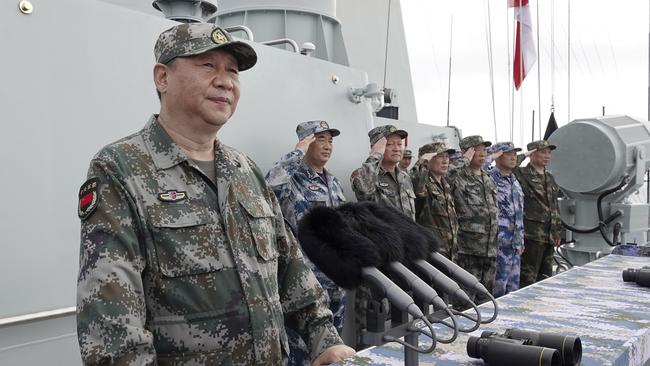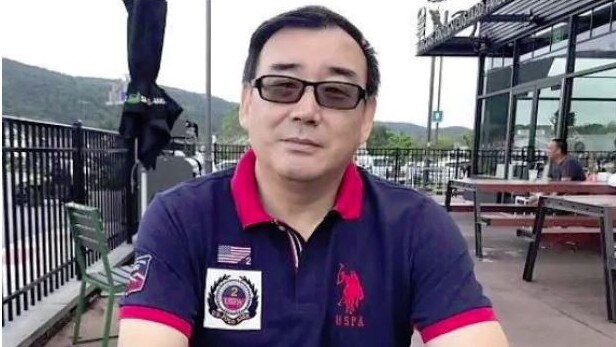The backlash from Beijing
Yang Hengjun’s arrest reflects China’s growing lack of tolerance.

China’s arrest of Australian-Chinese author and diplomat Yang Hengjun has provided a sharp reminder to the world of the harder edge of the Xi Jinping era.
Yang’s arrest as he flew into Guangzhou in southern China last weekend is in line with the President’s moves to tighten control of public criticism and intensify the monitoring of social media comments by Chinese at home and overseas.
But the clampdown also highlights the fact Xi is under increasing pressure at home from a slowing economy while facing a new pushback from key international forces over China’s reach.
The arrest overshadowed what was meant to be a friendly visit to China yesterday by Defence Minister Christopher Pyne.
He met his Chinese counterpart, General Wei Fenghe, at the headquarters of the People’s Liberation Army in a bid to reset strained ties between Beijing and Canberra.
Bill Shorten has described Yang’s arrest as “very concerning”. “I can’t pretend otherwise,” he said yesterday.
The Opposition Leader said it was disappointing that China had taken five days to inform the Australian embassy in Beijing of Yang’s arrest.
“This is not the way in which relations between our two countries should be conducted at all.”
China-watcher John Garnaut, a friend of Yang, warned that the arrest “will reverberate globally if authorities do not quickly find an off-ramp”.
As people buy bright red decorations to greet the Chinese New Year, which starts on February 5, few will be celebrating the end of the Year of the Dog more enthusiastically than Xi.
On the surface Xi, who has been President since November 2012, is one of the most powerful people in the world.

He became arguably China’s most powerful figure since Mao Zedong in March last year when the National People’s Congress scrapped the post-Mao convention that leaders hold power for two five-year terms.
But while Xi has strengthened Communist Party control, he finds Beijing under attack on many fronts from overseas.
US President Donald Trump has confronted Beijing with an expanding trade war as growth in the Chinese economy fell to its lowest level since 1990 despite heightened stimulus measures and a push for banks to lend more.
Telecommunications giant Huawei, until recently the poster boy for Chinese technology, is accused of designing products to serve as trojan horses for Beijing’s spies. Huawei’s chief financial officer, Meng Wanzhou, was arrested in Canada last month and faces extradition to the US on the charge of violating sanctions against Iran.
Xi’s signature Belt and Road Initiative has been described as a debt trap for China’s Third World allies.
Last month’s arrest of two Canadians in China — following Meng’s arrest in Vancouver on December 1 — was criticised this week in an open letter by more than 130 concerned international academics and retired diplomats including Australia’s former foreign minister Gareth Evans and former ambassador to China Ric Smith.
The signatories warned that foreign researchers and others with an interest in China were worried about a new level of risk when visiting China to explore its view of the world.
The outcry grew last week when a third Canadian, Robert Lloyd Schellenberg, was sentenced to death for trying to smuggle drugs from China to Australia in 2014. His punishment was increased from a 15-year jail term handed down in November.
Acting Foreign Minister Simon Birmingham criticised the death sentence and US Secretary of State Mike Pompeo described it as “politically motivated”.
Some in China wonder whether Yang’s arrest is based on his criticism of Beijing or indicates that Australia is joining Canada in the firing line.
Writing in his newsletter Sinocism yesterday, US-based China-watcher Bill Bishop said Yang’s arrest “could be related to Australia’s policies towards Huawei”.
“It could also be a case of the authorities wanting him due to his overseas writings and that this was a seizure of opportunity as he visited China for the first time in a while,” he added.
“It only heightens the feeling that visiting China is unsafe and that the security services may be going after people for what they say outside of China”
“Regardless, it only heightens the feeling that visiting China is unsafe and that the security services may be going after people for what they say outside of China.”
A speech by Xi to senior officials in Beijing this week reflected the increasing pressures on his administration. He told them to prepare for turbulence and disruption, warning that China must be on high alert for “black swan” — or unforeseen — risks. He said officials must prevent any “grey rhino” — an obvious but ignored threat — in politics, the economy, ideology and technology.
China is “confronted with unpredictable international developments and a complicated and sensitive external environment”, the President added. “Our task at hand is to maintain stability as we continue our reform and development. We must maintain a high degree of vigilance.”
In a speech last month to mark 40 years of Chinese economic reform, Xi warned that the country could face “unimaginable, terrifying tidal waves and horrifying storms” in the years ahead.
His comments came as economic growth for last year was confirmed at 6.6 per cent and a report from the International Monetary Fund found that one of the key risks to the global economy was the potential for China’s economic slowdown to be sharper than expected. China’s economic growth rate is still higher than that of the leading developed nations, and at a level many world leaders would envy.
Some economists predict China’s growth rate could dip to 5 per cent or lower. The reality for Beijing is that the more prosperous period experienced in the years since the West faced the consequences of the global financial crisis is now behind China.
There are already reports of layoffs in manufacturing regions in southern China.
Employers reportedly are allowing workers to go home early for the Spring Festival marking the new year, but not all of them will be able to return to their jobs after the holiday.
Almost from the time he was made President for life, Xi found himself under sustained attack from the Trump administration, which has been concerned at Beijing’s industrial modernisation policy, Made in China 2025, which seeks to make the country more technologically self-sufficient.
Xi’s critics within China have quietly raised questions about whether the country would have been better off with the more low-key approach of former leader and reforms pioneer Deng Xiaoping, who said it was far better to “hide your strength, bide your time”.
Trump has accused China of unfair trading policies, hitting it with higher tariffs on more than $US200 billion ($280bn) worth of Chinese exports to the US and threats of more tariffs on the rest of China’s exports. The US President has set a deadline of March 1 for China to negotiate a new trade deal or risk more tariffs.
China has reacted with caution in its dealings with the US, expressing its commitment to seeking a deal.
But it has already offered major concessions to Trump, including reducing tariffs on US car imports, buying more US soybeans and more generally promising to buy a lot more American goods.
The talks will move to a higher level next week when Chinese Vice-Premier Liu He visits Washington. But it appears that from the US point of view an acceptable deal will involve more concessions from China and an agreement on strict monitoring of the conditions of the terms of any deal.
Speaking at the World Economic Forum in Davos, Switzerland, this week, Hong Kong’s Chief Executive Carrie Lam said she was “not too optimistic” about prospects of a lasting trade deal between the US and China.
“There are fundamental problems that have yet to be addressed,” she said, critically aware of how Hong Kong will also suffer from a trade war.
“I doubt very much those fundamental problems could be addressed within a short period.”
In the past six months Australia has moved to ban Huawei from supplying its 5G network, followed by other moves to limit the company’s sales of telecommunications equipment in New Zealand, the US, Japan and Europe. The US is also imposing controls on critical semiconductor exports to China, which has hit Chinese telecom company ZTE — and provided a reminder to Beijing of its dependence on some critical US technology.
Meanwhile in Europe, even business leaders in Germany — one of China’s most robust trading partners — are calling for European-wide measures to limit Chinese investment.
The emerging international view of China no longer sees it primarily as a formidable economic engine and international investor.
A more hawkish narrative is epitomised by the bitter attacks on China by US Vice-President Mike Pence and others.
They contend that China’s rise has come at the expense of jobs in the developed world, particularly the US.
In a speech in Davos this week, Chinese Vice-President Wang Qishan spoke of the strength of his nation’s economy while hitting out at international “bullying” tactics.
He argued that China’s growth rate was “not low at all”, and vowed that it would “continue and be sustainable”.
“Unilateralism, protectionism and populism are spreading in the world,” he warned.
“It’s imperative to respect national sovereignty and refrain from pursuing technological hegemony, interfering in other countries’ domestic affairs, and conducting, shielding or protecting technology-enabled activities that undermine other countries’ national security.
“We reject the practices of the strong bullying the weak, and self-claimed supremacy.”
Richard McGregor, a senior fellow at the Lowy Institute and one of the signatories of the open letter calling for the release of the two Canadians, says Xi “is very clear about the path he wants to take China on, and he is not minded to deviate”.
“The big question is whether, in the face of a concerted international pushback, not just from the US but from numerous of its allies as well, Xi at all modifies his views or positions on any issues,” McGregor tells The Australian.
“In the short term, I doubt if we will see anything other than tactical retreats.”
McGregor says the economy is the crucial issue for China this year, particularly given Xi’s support for the role of the state-owned sector — the sector with the lowest efficiency and high debt levels — in the economy.
“Xi can command China’s political landscape but he cannot wave a magic wand over a slowing economy,” he says.
“He is under heavy criticism at home from liberal economists for promoting the interest of state companies over the market, to the detriment of the economy overall.”
McGregor adds: “Xi has a pragmatic streak on the economy — he recently met with entrepreneurs to reassure them he supported the private sector.
“But I suspect his pragmatism only goes so far.”




To join the conversation, please log in. Don't have an account? Register
Join the conversation, you are commenting as Logout